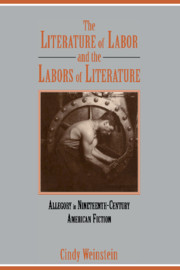 The Literature of Labor and the Labors of Literature
The Literature of Labor and the Labors of Literature Book contents
- Frontmatter
- Contents
- Acknowledgments
- Introduction
- 1 The Problem with Labor and the Promise of Leisure
- 2 Hawthorne and the Economics of Allegory
- 3 Melville's Operatives
- 4 Twain in the Man-factory
- 5 The Manikin, the Machine, and the Virgin Mary
- Afterword
- Notes
- Index
- CAMBRIDGE STUDIES IN AMERICAN LITERATURE AND CULTURE
Introduction
Published online by Cambridge University Press: 06 July 2010
- Frontmatter
- Contents
- Acknowledgments
- Introduction
- 1 The Problem with Labor and the Promise of Leisure
- 2 Hawthorne and the Economics of Allegory
- 3 Melville's Operatives
- 4 Twain in the Man-factory
- 5 The Manikin, the Machine, and the Virgin Mary
- Afterword
- Notes
- Index
- CAMBRIDGE STUDIES IN AMERICAN LITERATURE AND CULTURE
Summary
The narrator of Poe's “The Man That Was Used Up” is thoroughly captivated by Brevet Brigadier-General John A. B. C. Smith, whose good looks and fine physique make him “ an especial favorite” with “the ladies” as well as the gentlemen in the tale. He lingers over each part of Smith's s body, from “the handsomest pair of whiskers under the sun, ” “a mouth utterly unequalled, ” and “the most brilliantly white of all conceivable teeth” to the “admirably modelled” arms and the “properly proportioned calf” (405–6). But even as he delectates in Smith's s “bodily endowments”(406), the narrator begins to suspect that the sum of these endowments does not equal its parts:
There was a primness, not to say stiffness, in his carriage – a degree of measured and, if I may so express it, of rectangular precision attending his every movement, which, observed in a more diminutive figure, would have had the least little savor in the world of affectation, pomposity, or constraint, but which, noticed in a gentleman of his undoubted dimensions, was readily placed to the account of reserve, hauteur – of a commendable sense, in short, of what is due to the dignity of colossal proportion.
(406)- Type
- Chapter
- Information
- The Literature of Labor and the Labors of LiteratureAllegory in Nineteenth-Century American Fiction, pp. 1 - 12Publisher: Cambridge University PressPrint publication year: 1995


